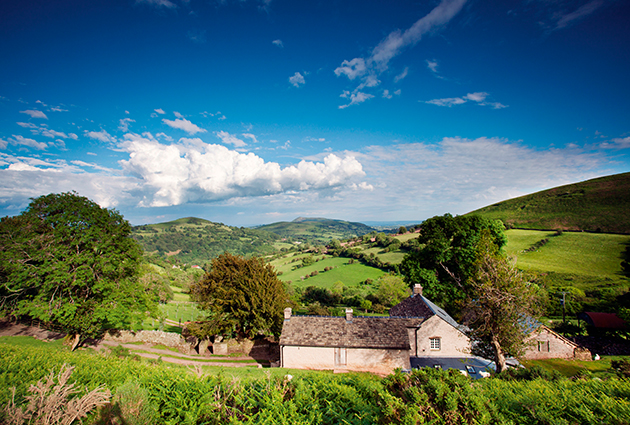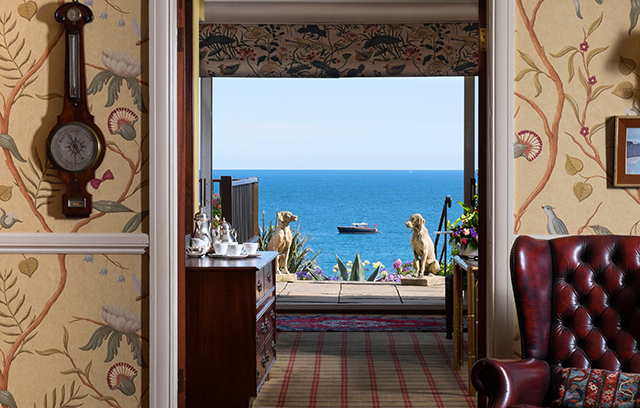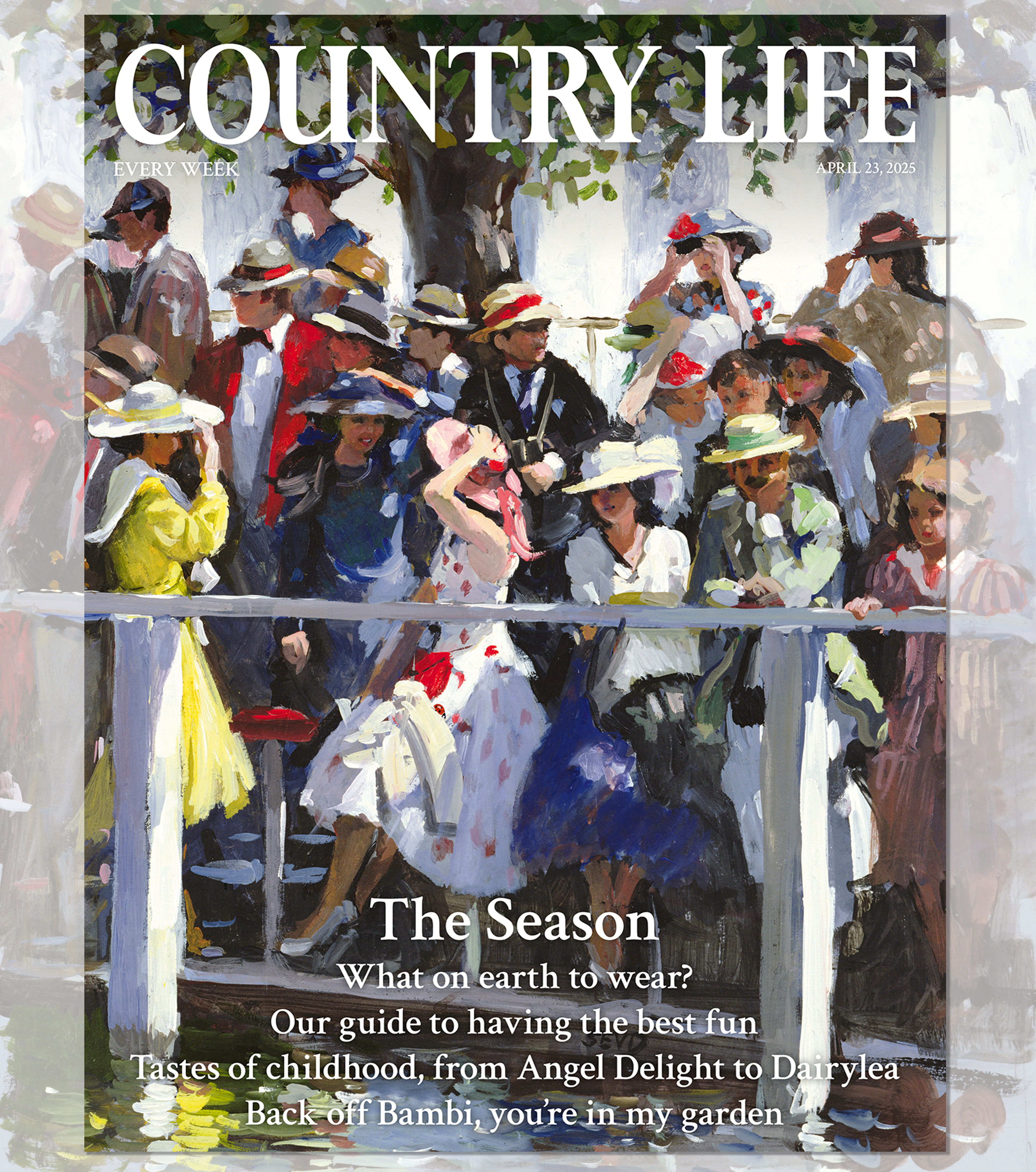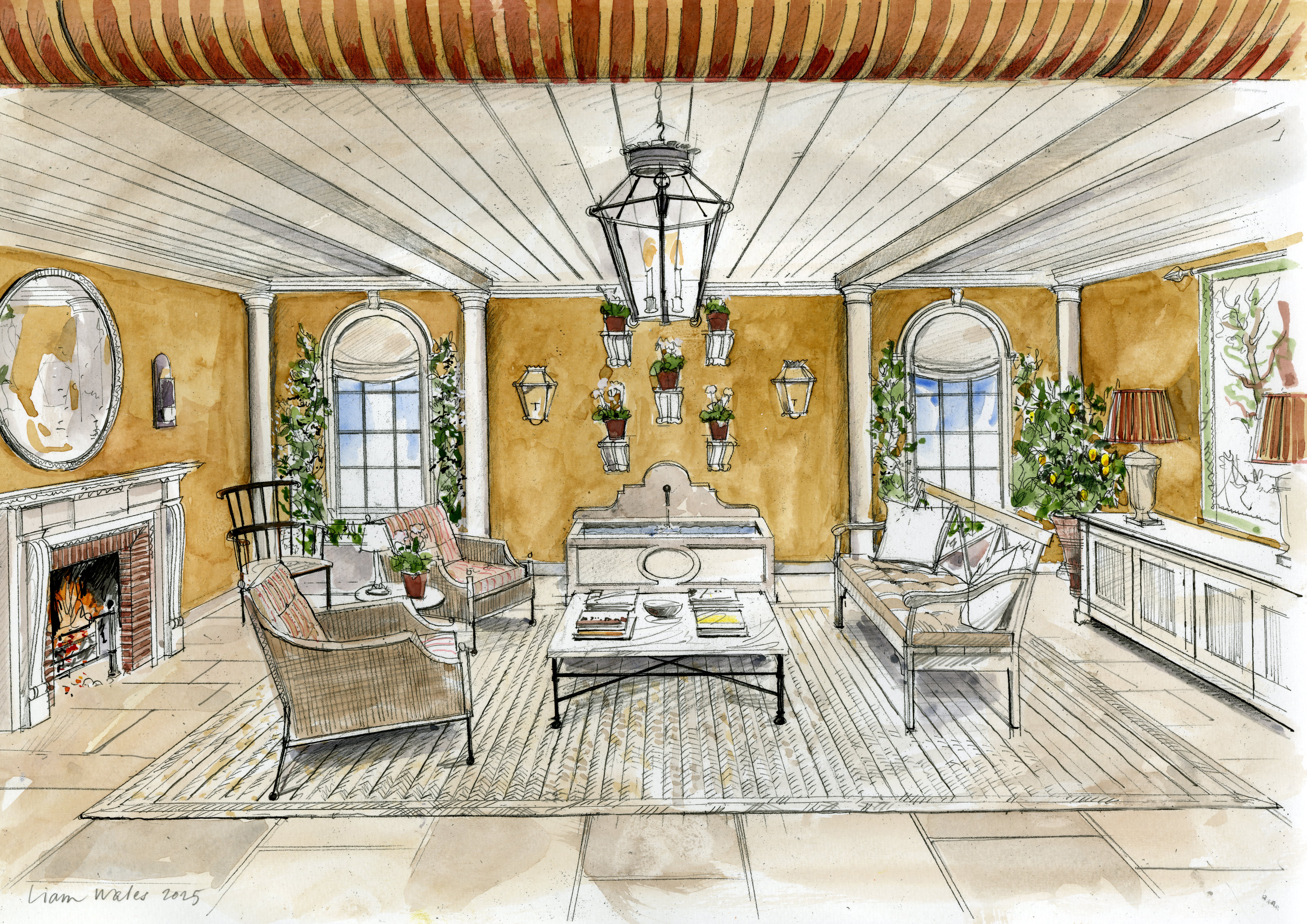Special places to stay in 2016
Some of the loveliest places to stay in the UK from Ayrshire to Wiltshire


Welsh wonder After leaving a minor road—so minor that there’s grass growing in the middle of the tarmac—there are a further five gates and two cattle grids to cross before you finally reach the Patrishow Farm (above), set like an eagle’s eyrie in a cleave in the slope at the top of the Welsh Black Mountains. The view is quite breathtaking. Astonishing. Hanging high above the plunging green valley, you really are in the middle of nowhere, surrounded by the farm’s 100 acres. It is utter bliss.
Immediately, however, I was struck by what a difficult life it must have been to live and farm these steep hills in times past when the market town was a day away and the nearest neighbour an hour’s walk. However, poor places are often the best preserved by time and that’s true here. The sty for the house pig still lies next to the old privy, but, inside, the owners have added a slick modern kitchen in a striking oak-and- glass conservatory to make the most of the panoramic views.
Underfloor heating and a vast open fire ensure that you’re always as snug as can be. The farmhouse has been splendidly updated throughout, so that lavish comfort mixes with bric-à-brac furniture and old Welsh dressers. The overall effect is utterly charming.
Far below is the extraordinary church, which is a must to visit with its oak rood screen, pre-Reformation paintings, hermit’s holy well and painted skeleton of a ‘figure of doom’, hold- ing a scythe, hourglass and spade. It’s been whitewashed over many times, but always reappears.
Patrishow must be one of the best cottages you can rent in Wales. Whether you want to walk, read or soak in the scenery, you’re sure to leave it refreshed. (www.sugarandloaf.com/luxury-holiday-cottage-wales/brecon-beacons-and-black-mountains/patrishow-farm)
Living the dream Scotland’s east Ayrshire coast tends to go under the radar—unless Troon and next year’s golfing Open is your destination—as the tourist trail thunders up the M74 towards the Highlands. Turn left, however, and there’s unspoilt moorland and farmland and a dramatic coast road. Donald Trump aside, it’s not a wealthy area; its riches lie in landscape and culture: Robert Burns’ birthplace and Culzean Castle. Dumfries House is also doable.
There are no signposts to comfortable Glenapp Castle at Ballantrae, a 17-bedroom oasis of privacy in 36 wooded acres with beguiling views to Ailsa Craig and the Mull of Kintyre. The staff are genuinely sincere, the wine list is epic and the cooking exquisite; my highlights were white onion velouté, roast quail and apple soufflé. The castle, built in 1870, became part of the Inchcape family’s estate; it was categorised as ‘at risk’ when the McMillan family hoteliers bought it in 1994 and restored it to opulent baronial style.
Sign up for the Country Life Newsletter
Exquisite houses, the beauty of Nature, and how to get the most from your life, straight to your inbox.
Glenapp, part of the Relais & Chateaux group, has now been added to Yorkshireman Paul Szkiler’s investment portfolio. Big plans include buying a boat, developing outbuildings, offering classic-car and lecture weekends and emphasising local fieldsports: roe- and red-deer stalking, pheasant, partridge and woodcock shooting and fishing.
The Stinchar, which flows into the sea at Ballantrae, was too low on my visit, but no time spent on a river- bank is wasted. Watching plopping trout and whizzing kingfishers from Gilbert Browne’s fishing hut is the memory that will stick. Mr Browne (Kirkhill Fishings, 07866 166126), an artist returned to his homeland, lives the dream; he downsized and bought a mile of riverbank on which he maintains paths, plants fruit trees, feeds birds and proffers humorous wisdom. The hotel can book you a similarly restorative afternoon. Packages from £375 per couple per night (01465 831212; www.glenappcastle.com)
The country-house hotel by the sea

Gazing out of a train window and seeing only water, you feel as if you’ve reached the edge of the world. However, this isn’t the edge of the world, just the UK—it’s the Dawlish line, which is soon to deliver me to Truro and Cornwall’s only four-red-star hotel. The phrase ‘a stone’s throw’ is much overused, but if I took a run up, I could probably land one on the National Trust-owned Carne Beach, which stretches away below my balcony and this self-styled ‘country- house hotel by the sea’. The Nare is a home away from home for a Country Life girl, with Tottering cartoons on the walls, ‘country- house measures’ in the bar and decanters of sherry in the rooms. Said rooms have quirky touches— our television is concealed inside a painting. Just be sure to choose a suite overlooking the bay to enjoy the spectacular sunsets, which are as beautiful as any artwork inside. Dogs, of course, are quite welcome— indeed, they have their own menu.
The Dining Room’s menu is quite something, too. I sample sumptuous duck terrine, Portloe lobster and local cheeses, with Champagne, vintage port and local spring water. My steak, flambéed at the table, is the best I’ve ever eaten and, although the silver-service menu changes daily, it always offers lobster. I almost wish I’d refrained from the complimentary Cornish cream tea, served each afternoon. Almost—but not quite.
My indulgent weekend also includes a relaxing facial, strolls on the sand, plus sessions in the pool and hot tub, but the highlight is undoubtedly a trip on The Nare’s 38ft traditional gentleman’s launch, Alice Rose. With scheduled sailings and and private charters, it’s the most idyllic way to see St Mawes and Falmouth. Double rooms at The Nare, Carne Beach, Veryan-in-Roseland, Cornwall, from £284 per night. Sailing from £85 per person (01872 501111; www.narehotel.co.uk). Single tickets from London Paddington to Truro from £62 (0345 700 0125; www.gwr.com)
How to save the great British pub There’s a new breed of British pub, which has become a destination in itself. The latest is The Royal Oak Inn in Swallowcliffe, a delightful Wiltshire village inn tucked in a combe 13 miles from Salisbury. It’s taken a seven-year battle by locals to fight off proposals to turn it into a private house, but, in September, it reopened to the delight of all.
The rescue is down to three local residents who wanted to do something for Swallowcliffe. Jeremy Little, the prime mover, says: ‘Without a pub, a village is simply a hamlet. When the pub closed, there was the church and village hall, but a pub is neutral ground where people are most at ease.’
The Royal Oak is open daily from 11am to 11pm, starting with coffee and early drinks and, if you’re a visitor arriving too late for lunch, the tempting bar menu is served until 9pm. Inside, it’s still a traditional pub, with low ceilings and a log fire burning in the original hearth. Matthew Burt’s furniture is the best I have ever seen in a pub.
The patrons put their own money in, spending, Mr Little admits, more than they intended to ensure a first-class product: ‘There’s no certain prospect of getting our money back. It’s an investment in the community first and foremost.’
The six bedrooms come with Egyptian-cotton sheets, goosedown pillows and duvets, wi-fi and ensuite baths or showers. Rooms from £100 per night (01747 870211; www.royaloakswallowcliffe.com
Country Life is unlike any other magazine: the only glossy weekly on the newsstand and the only magazine that has been guest-edited by HRH The King not once, but twice. It is a celebration of modern rural life and all its diverse joys and pleasures — that was first published in Queen Victoria's Diamond Jubilee year. Our eclectic mixture of witty and informative content — from the most up-to-date property news and commentary and a coveted glimpse inside some of the UK's best houses and gardens, to gardening, the arts and interior design, written by experts in their field — still cannot be found in print or online, anywhere else.
-
 Country Life 23 April 2025
Country Life 23 April 2025Country Life 23 April 2025 looks at how to make the most of The Season in Britain: where to go, what to eat, who to look out for and much more.
By Toby Keel
-
 The big reveal: A first look at Country Life's RHS Chelsea Flower Show stand
The big reveal: A first look at Country Life's RHS Chelsea Flower Show standInterior designer Isabella Worsley reveals her plans for Country Life’s ‘outdoor drawing room’ at this year’s RHS Chelsea Flower Show.
By Country Life